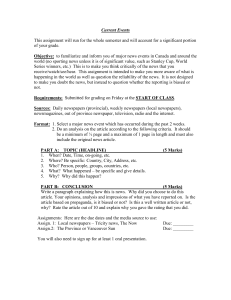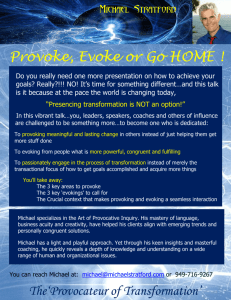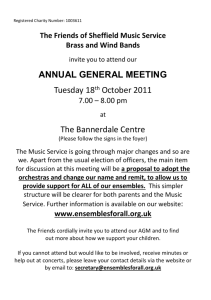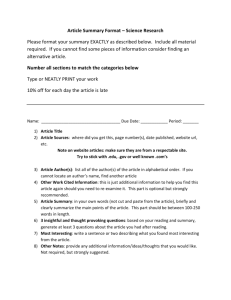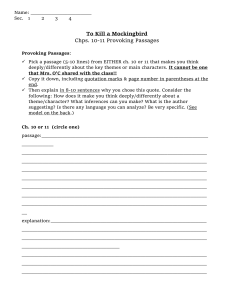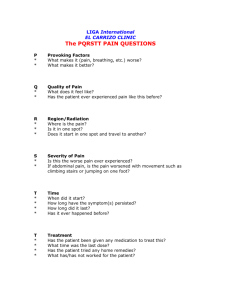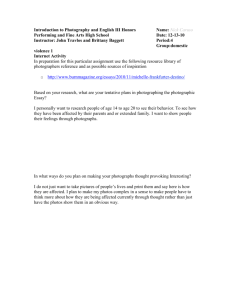Provoking_Curriculum,_CFP,_June_23,_2014
advertisement
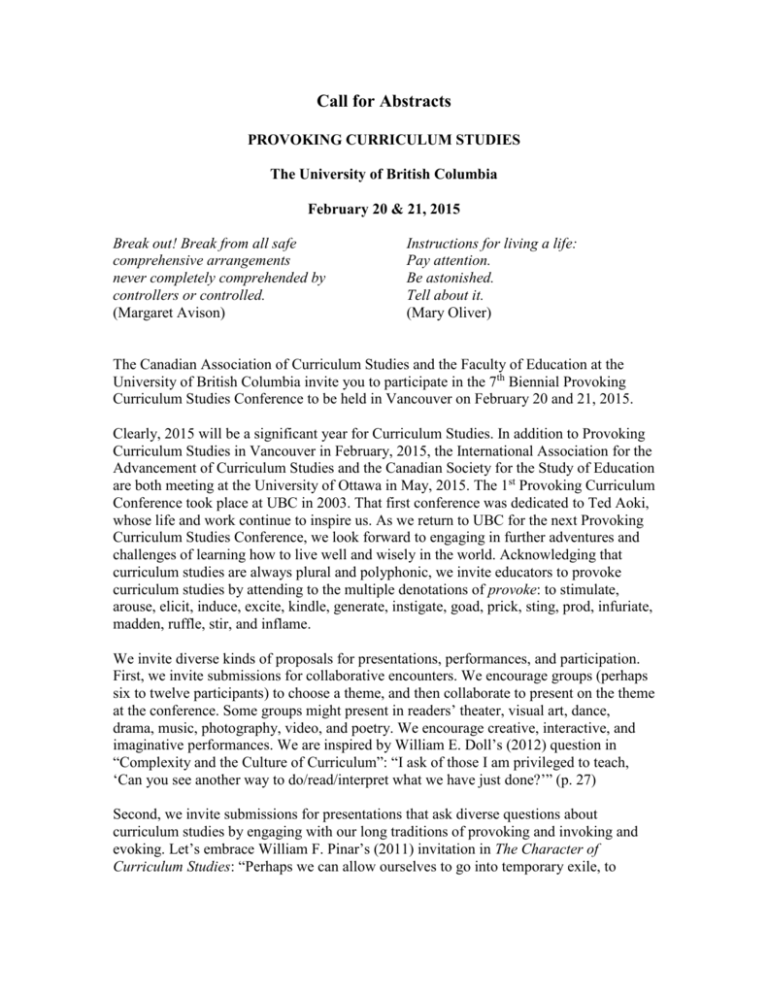
Call for Abstracts PROVOKING CURRICULUM STUDIES The University of British Columbia February 20 & 21, 2015 Break out! Break from all safe comprehensive arrangements never completely comprehended by controllers or controlled. (Margaret Avison) Instructions for living a life: Pay attention. Be astonished. Tell about it. (Mary Oliver) The Canadian Association of Curriculum Studies and the Faculty of Education at the University of British Columbia invite you to participate in the 7th Biennial Provoking Curriculum Studies Conference to be held in Vancouver on February 20 and 21, 2015. Clearly, 2015 will be a significant year for Curriculum Studies. In addition to Provoking Curriculum Studies in Vancouver in February, 2015, the International Association for the Advancement of Curriculum Studies and the Canadian Society for the Study of Education are both meeting at the University of Ottawa in May, 2015. The 1st Provoking Curriculum Conference took place at UBC in 2003. That first conference was dedicated to Ted Aoki, whose life and work continue to inspire us. As we return to UBC for the next Provoking Curriculum Studies Conference, we look forward to engaging in further adventures and challenges of learning how to live well and wisely in the world. Acknowledging that curriculum studies are always plural and polyphonic, we invite educators to provoke curriculum studies by attending to the multiple denotations of provoke: to stimulate, arouse, elicit, induce, excite, kindle, generate, instigate, goad, prick, sting, prod, infuriate, madden, ruffle, stir, and inflame. We invite diverse kinds of proposals for presentations, performances, and participation. First, we invite submissions for collaborative encounters. We encourage groups (perhaps six to twelve participants) to choose a theme, and then collaborate to present on the theme at the conference. Some groups might present in readers’ theater, visual art, dance, drama, music, photography, video, and poetry. We encourage creative, interactive, and imaginative performances. We are inspired by William E. Doll’s (2012) question in “Complexity and the Culture of Curriculum”: “I ask of those I am privileged to teach, ‘Can you see another way to do/read/interpret what we have just done?’” (p. 27) Second, we invite submissions for presentations that ask diverse questions about curriculum studies by engaging with our long traditions of provoking and invoking and evoking. Let’s embrace William F. Pinar’s (2011) invitation in The Character of Curriculum Studies: “Perhaps we can allow ourselves to go into temporary exile, to undergo estrangement from what is familiar and everyday and enter a third space, neither home nor abroad, but in-between, a liminal or third space…” (p. 76). While we invite a wide range of abstracts, we particularly welcome proposals that promise to provoke curriculum studies, and we plan to organize the conference so there will be opportunities for lively conversation among colleagues. Possible words for provoking creative conversations about curriculum studies include: Aesthetics Art(s) Astonishment Balance Breath/ing Care Cartography Character Class Compassion Complexity Contemplation Creativity Dance Dreams Ecology Embodiment Emotion Epistemology Ethics Ethos Fiction Foundations Generativity Genealogies Healing Heart History I Identity Ideology Imagination Inspiration Interconnections Joy Journey Knowing Land Literature Living Loving Meditation Memory Métissage Muses Music Multimodality Nonsense Ontology Other Passion Performance Philosophy(ies) Play Poetry Postmodernism Prayer Questions Relations Race Rapprochement Roots Rules Sensuousness Sexuality Silence Spirituality Story-telling Teaching Technology Topography Tradition Truth Urgency Voice Wisdom Wor(l)ds X You Zeal When submitting a proposal, please, include the following: Name & e-mail address for each participant involved in the proposal Institutional affiliation Title of the presentation 250-word abstract with a clear explanation of the presentation format Please, send your proposals by October 15, 2014 to: Carl Leggo, University of British Columbia, carl.leggo@ubc.ca Note: The organizing committee has not yet determined the registration fee. The Organizing Committee currently includes: Erika Hasebe-Ludt, Peter Grimmett, Rita Irwin, Anita Sinner, Carl Leggo
